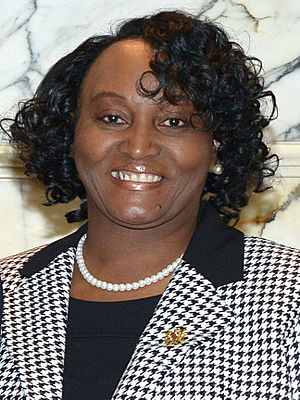Diana M. Fennell facts for kids
Quick facts for kids
Diana M. Fennell
|
|
|---|---|
 |
|
| Member of the Maryland House of Delegates from the 47A district |
|
| Assumed office January 14, 2015 Serving with Jimmy Tarlau and Julian Ivey
|
|
| Preceded by | Michael G. Summers |
| Mayor of Colmar Manor, Maryland | |
| In office 2000–2010 |
|
| Preceded by | Michael L. Garrett |
| Succeeded by | Michael E. Hale |
| Member of the Colmar Manor Town Council | |
| In office 1995–2000 |
|
| Personal details | |
| Born | August 6, 1967 Emporia, Virginia |
| Political party | Democratic |
| Spouse | Jeffrey T. Fennell Sr., |
| Children | Jeffrey Jr. and DeJanee |
| Residences | Colmar Manor, Maryland, U.S. |
Diana M. Fennell was born on August 6, 1967. She is an American politician who works for the people of District 47A. She is a member of the Maryland House of Delegates. Before this, she was the mayor of Colmar Manor, Maryland from 2000 to 2010. She also served on the Colmar Manor town council from 1995 to 2000.
Contents
Early Life and Public Service
Diana Fennell was born in Emporia, Virginia. She finished high school there. In 2004, she studied local government at the University of Maryland, College Park. This helped her learn more about how local towns are run.
In the early 1990s, Diana moved to Colmar Manor, Maryland. A neighbor encouraged her to get involved in local government. In 1995, she was elected to the Colmar Manor town council. This was her first step into public service.
In 2000, she became the mayor of Colmar Manor. She served as mayor for ten years. This role meant she was in charge of the town's daily operations.
Running for State Delegate
In 2002, Diana Fennell first tried to become a state delegate. A state delegate is someone who represents a district in the state's law-making body. She ran for the Maryland House of Delegates in District 47. She did not win that election.
She tried again in 2014 for the Maryland House of Delegates. This time, she won the primary election. She then won the general election with 52.1 percent of the votes. This meant she would represent District 47A.
Working in the Legislature
Diana Fennell officially became a member of the Maryland House of Delegates on January 14, 2015. She joined the House Ways and Means Committee. This committee handles important topics like taxes and how the state spends money.
Within this committee, she works on several smaller groups. These include election laws, money matters, and state income. She is also part of other important groups. These include the Prince George's County Delegation and the Women Legislators of Maryland. She is also a member of the Legislative Black Caucus of Maryland.
What She Believes In
Diana Fennell has worked on several important issues.
Elections
In 2019, she voted for a law that changed rules about who can donate money to political campaigns. This law affected county races in Prince George's County, Maryland.
Minimum Wage
In 2019, Diana Fennell introduced a bill to raise the minimum wage to $15 an hour. This would happen by 2023. Her bill also wanted to slowly remove the lower wage for workers who get tips by 2026. The bill was changed a bit during discussions. The new plan was to reach the full minimum wage by 2025. It also removed a part that would automatically increase the wage based on prices. The bill passed and became law on March 28, 2019.
Her Election Wins
Diana Fennell has run in several elections. She won her first election for the Maryland House of Delegates in 2014. She was re-elected in 2018. These wins allowed her to continue serving the people of Maryland.
 | Victor J. Glover |
 | Yvonne Cagle |
 | Jeanette Epps |
 | Bernard A. Harris Jr. |


